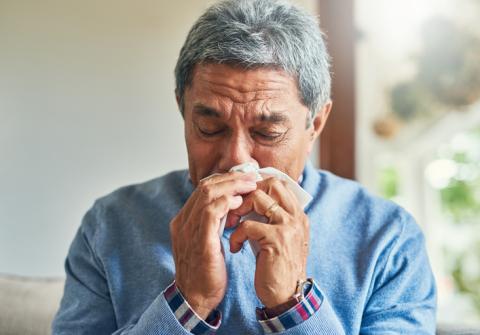How to Treat a Winter Cold
Is it the flu, or just a cold?
If you wake up with sniffles, sneezing and a sore throat, it’s probably an upper respiratory infection—“the common cold.” Colds might not feel so common, because they can make us pretty miserable! As a matter of fact, we might feel so sick that we think we have the flu. But these two illnesses are caused by different viruses. It’s good to know which one you have, so you can choose the appropriate treatment.
Seasonal influenza (“the flu”) usually begins suddenly with a very painful sore throat. A person might have a runny nose and congestion, but the most noticeable symptoms are a headache, muscle aches, extreme fatigue and a high fever that can last for days. The flu can have serious complications, especially for older adults. Seniors who think they have the flu should call the doctor right away; the doctor might prescribe antiviral medications such as Tamiflu.
Colds also typically begin with a sore throat, but it’s usually short-lived and then the runny nose, congestion and sneezing begin. Body aches, if any, are mild, and most people won’t get a high fever with a cold. The Centers for Disease Control and Prevention (CDC) says that colds seldom cause serious health problems. Treatment at home is usually fine.
Treating a cold
Most adults who catch a cold will feel better within a few days. Other colds fall into what doctors colloquially call “a bad cold,” which can last longer, with more miserable symptoms. As the saying goes, “there is no cure for the common cold,” but you can take steps to feel better while your body is fighting that bug.
One of the best ways to weather a cold is to rest. Stay home from work and other activities if you can. (This is also a courtesy to others, who will be grateful to avoid catching your germs.)
Other self-care steps include:
- Drink plenty of fluids.
- Don’t smoke, and stay away from secondhand smoke.
- Use a humidifier or cool mist vaporizer. (Note: be sure these devices have been properly cleaned.)
- Breathe in steam from the shower or a bowl of hot water.
- Use saline nasal spray or drops.
- Gargle with warm salt water.
What about medications?
Over-the-counter cough and cold medicines can relieve symptoms. Experts point out that coughing is your body’s way of getting rid of mucus from your lungs, so only take a cough suppressant if you really need to.
Throat lozenges, cough drops and throat spray can relieve pain and soothe a cough.
Acetaminophen (Tylenol) and ibuprofen (Advil, Motrin) help relieve muscle aches and lower fever. Aspirin is not recommended for treating cold symptoms.
Note: Antibiotics do not work against the viruses that cause colds and will not help you feel better. Some people take home remedies such as vitamin C, zinc and echinacea. While there is no evidence that these substances are helpful and some may have side effects, they are safe for most people. Talk to your doctor about any supplements you take.
Remember that over-the-counter medications can interact with prescription and nonprescription drugs, so ask your doctor which cough and cold remedies are safe for you.
Should I call the doctor?
Colds usually clear up by themselves, and most people can be treated at home. But a cold can progress to a sinus infection, bronchitis or pneumonia. If you’re older than 65 and a cold persists for longer than a week, check in with your healthcare provider. And call the doctor right away if you experience severe chest pain, difficulty breathing, dizziness or confusion.
The information in this article pertains to adults only and is not intended to replace the advice of a person’s health care provider.
